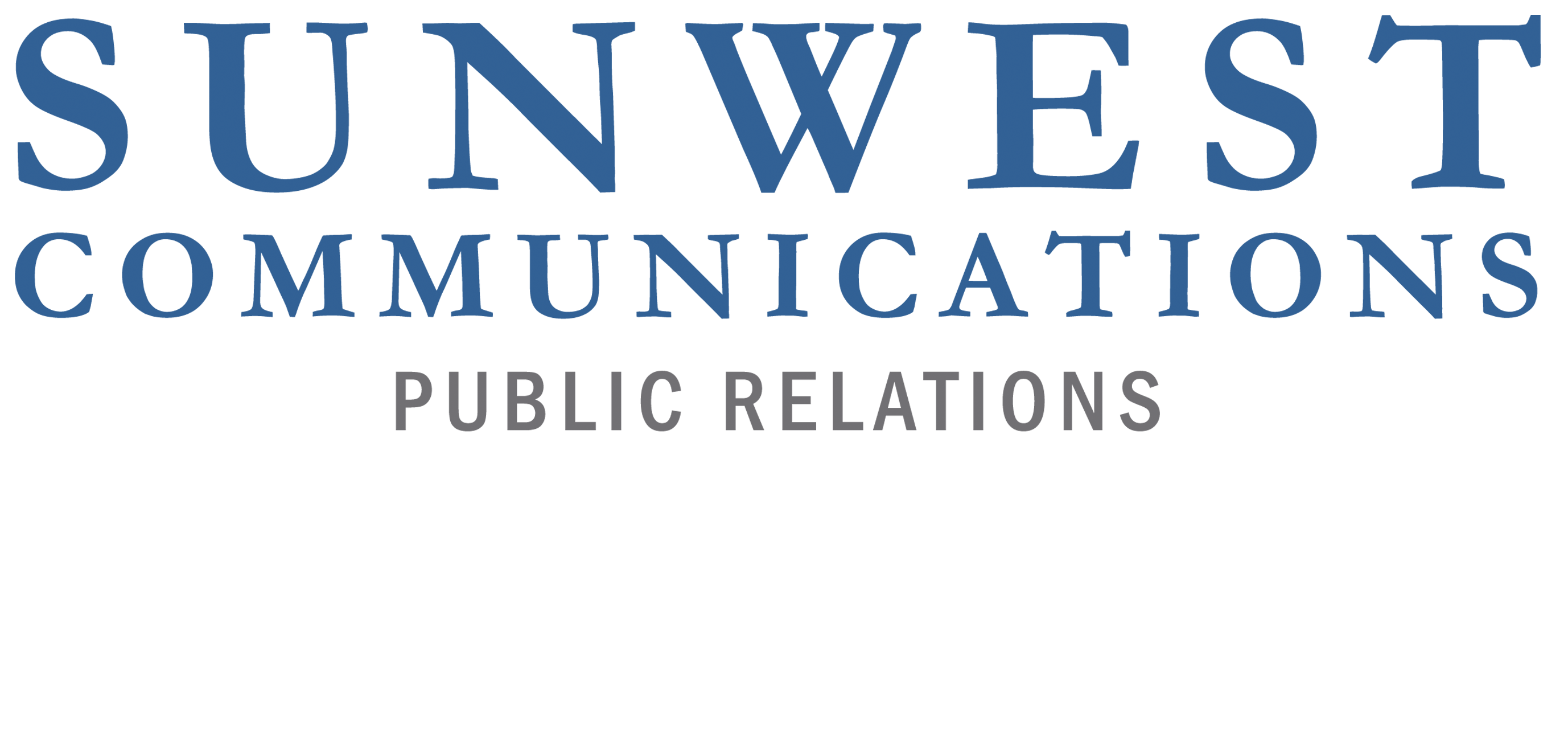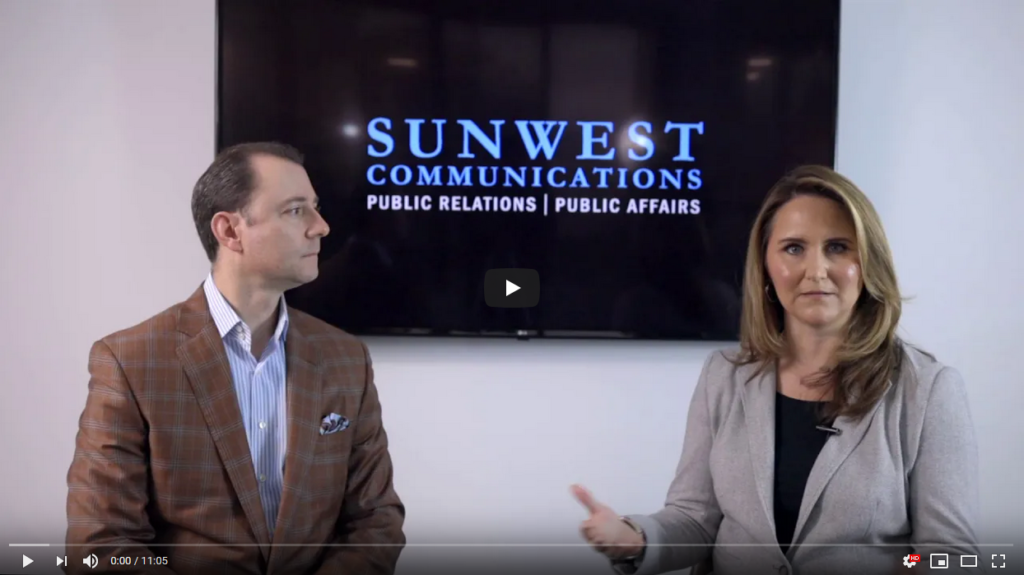CSR Strategy in the Time of the Coronavirus
March 13, 2020
Hi everyone. Today we’re going to talk about the coronavirus, COVID-19, of course. Right now, is there any other topic? It’s what everybody’s talking about. But as opposed to Sunwest giving you advice or tips about communicating during times of crisis, today we’re going to talk about something a little bit different – perhaps unexpected – and that’s corporate social responsibility, social impact. And of course, joining me is our social impact expert, Whitney Strauss, Senior Advisor for Corporate Social Responsibility and Social Impact. Thank you for being here. Thank you. In a time of crisis, not everybody might think about how do I give back? How do I be a good corporate citizen? Of course, social responsibility is top of mind as it relates to whether we go into large public places, whether we keep our places of business open. But as it relates to philanthropy, how does a company, a brand, an organization right now decide whether they even should begin engaging?
[00:00:54] Well, it is an interesting time because the coronavirus is very different than a natural disaster in some ways. The steps are the same as far as preparedness, prevention, response and recovery. But those are all happening simultaneously around the world in different phases. So it does raise the question of how are we reacting? So I think any company needs to look at first, do they have a preparedness task force for disaster relief already? And are they incorporating CSR at the table? Because if they are not, that is something to consider doing because it’s not only how are we responding now in the wake of this happening in our communities, but also what will come with the recovery. And being very cognizant of what is our company culture. Now is actually an excellent time to be communicating what you stand for, what your values are, and then also what your core competencies are. And really being aware of this is how we could be helpful in these kinds of situations.
[00:02:01] And that’s good advice. Crisis or not, being true to your brand, being true to who you are, your mission and what your value proposition is in the way that you give back. But let me just play devil’s advocate a little bit, because I think most folks are in a position where they’re thinking we need to batten down the hatches. We’re sending people home, working from home. And of course, with the economy being in the shape that it’s in, folks are not especially anxious at this particular moment, on this particular day, to open up their checkbooks. What’s the retort to that? And the case – the business case, if you will – for staying engaged in CSR right now?
[00:02:36] I’m sensitive to that because there is a lot in flux right now and it is having a financial impact. I think that is something to be aware of as you look to how you are responding and also being prudent to take precautions that everyone is putting out there to make sure that you’re doing what’s appropriate right now, but also to have that lens to look forward, because as communities, the faster that we are able to recover, the more beneficial it is for everyone. And there are things that you can be doing that have nothing to do with giving per say. It is making sure are you checking on the populations that are the most vulnerable right now: the elderly. Are you encouraging your employees to check on those that have health reasons that could impact them differently than everyone else? And also looking at, you know, nonprofits are going to take a substantial hit if they’re on the front lines with first responders or if they’re in social services or health. They are just now seeing the impact of this from loss of volunteers and just being stretched. So there are ways that employers can be looking to help virtually that really has nothing to do with giving. Or even talent-based.
[00:03:52] Right. Right. Whether there’s legal needs or accounting needs. We’ve had some speculation, some reports that a lot of the reports that are coming out about things to do to keep yourself safe aren’t necessarily getting translated into Spanish in some communities. So are there communities that aren’t getting the news? If you have folks that speak Spanish or translate, is that something that you can do? But really, this is different than a natural disaster, isn’t it? Because we’re programmed now, unfortunately, when there is some kind of natural disaster and how we react – either financially or in getting people together to build care kits. But we don’t want to be getting people together right now. You don’t want to do that right now. So how is it different?
[00:04:31] That’s a big reason why it’s different is because typically in a natural disaster, it is all hands on deck that there are shelters that are set up and we’re dropping off things and we’re going and donating blood and everything like that. But this is different because we’re supposed to be keeping social distances and things like that. But I think there are ways and non-profits are now coming on board with this that you can help virtually and also to show that support. And again, looking at your core competencies, if you are a technology company or if you have that bandwidth with Skyping and things like that, that’s something that you can lend out to folks right now to be able to provide services virtually.
[00:05:14] So we have a lot of clients that, from a communications perspective, have something to add to the conversation. Either their supply chain has been impacted overseas – and that’s an interesting story from a PR perspective – or they have certain knowledge. We talk a lot about thought leadership. Their expertise in the C-suite can add value to the conversation during this time. But how do you step forward in a corporate citizenship, a social impact perspective? Let’s say, for example, you have a product that people could benefit from right now, at a time where the virus is spreading. How do you talk about that from a thought leadership perspective or a CSR perspective and not a pure opportunistic or like you’re leveraging this bad news and difficult time?
[00:06:04] I think that you need to be careful about that. I always give advice to clients to help how it’s helpful. So when you are touching base in your own cities and communities and across the world of what are those organizations that are doing relief efforts and are hands-on giving that back to their communities, asking them what they need and saying we have these resources, but we want to make sure are these the things that are really needed. Because what I’m hearing is the drop and dash of supplies, that we’re being cleaned out of cleaning supplies and that’s going to impact homeless shelters and food banks and a lot of the hands-on organizations that are right at the front lines of this public health crisis. So I think making sure that you’re giving back in a way that’s helpful, because I think if you stay insular with making that decision, it may not be what the community really needs. And sometimes that need is very simple. Sure.
[00:07:08] So that’s something that can be met. And going perhaps to a third party, a trusted nonprofit organization that you or your organization has worked with before and they’re the litmus test. So you say to them, we have this product, it’s good product. We don’t want to appear self-serving, but we do have some inventory we’re glad to donate to a marginalized community or an impacted community. But to your point, is there a need? Right. That’s the question. That’s the question.
[00:07:33] And I think every city and community has an emergency task force. So I find it interesting to see who are those organizations involved in that. And that’s very easy to access and then to call and they can guide you on what do we need at this time. And then also foreshadowing, what are we going to be needing in the future, too? Because I think that’s important to note as we begin to recover from the impact of this.
[00:07:58] So God willing, this, too, shall pass. We’ve seen other pandemics, H1N1 or swine flu, bird flu, but it could be some time, at least in the United States. We are seeing the peak in China has passed. What do we do afterwards? There will be significant needs.
[00:08:18] I think that trickle down is about to happen. It has not happened in the United States yet, but it’s about to. So when I’m talking to major non-profits across the country now, they’re all saying we’re just beginning to feel that impact. So I think it is being aware of the loss of volunteer support during this time is substantial. The loss when you’re seeing the rush on foods and things like that, you’re seeing vulnerable populations that are now going to be going for a time without having that access. Blood drives, a lot of those have been canceled across the country. So I think it is knowing that that trickle down is coming and that will have an impact. And then thinking through these next phases of your CSR strategy and how are we going to be engaged in the recovery efforts around that? Locally, nationally, globally. But then long term, I think this is an excellent opportunity as corporate citizens to be thinking through once we’re out of this disaster. What lessons did they learn? And are they prepared for a response in the future? Because unfortunately, we know hopefully not another viral infection like this. But I think the lessons learned from this will be very valuable to all of us in the community, especially when they’re looking at their CSR efforts. And do they have a strategy? Do they have a response? And making sure that they’re taking those lessons learned and implementing those for the future, too.
[00:09:45] And of course, even if you’re not engaging now while the virus is spreading, hopefully you have a corporate social responsibility strategy, you’re engaged in the community. And so your nonprofit, your mission, your cause of choice for your corporation with this hiccup in the economy, to say the least, is going to be impacted afterwards. Right. So all the more reason to be planning now to double down on your CSR strategy you have in place. Exactly. Afterwards. Yes, exactly. So if there was any takeaway, I guess it’s stay calm and keep giving. Right? Yes.
[00:10:22] And looking ahead and building your strategy, knowing that the recovery effort will begin hopefully very soon and we will all be needed to impact that in order to get our businesses, our community, our economy back up to speed. And the research that I’ve done, the faster that a community responds to those needs, the quicker that we will recover from this. So if we remain stagnant, it will stay that way for a long time. So it really is imperative for all of us to be thinking through that. Definitely.
[00:10:52] Whitney Strauss, Senior Counsel CSR and Philanthropic Services. On behalf of all of us at Sunwest, we wish you all the best. Stay well. Stay safe. We’ll see you next time.

